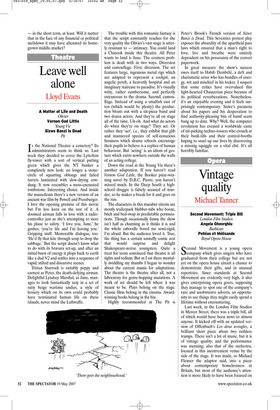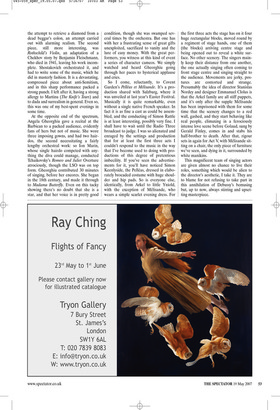Vintage quality
Michael Tanner
Second Movement: Triple Bill London Film Studios Angela Gheorghiu Barbican Pelléas et Mélisande Royal Opera House Second Movement is a young opera company which gives singers who have graduated from their college but are not yet on the opera house circuit a chance to demonstrate their gifts, and in unusual repertoire. Since standards at Second Movement are evidently very high, it also gives enterprising opera goers, supposing they manage to spot one of the company’s rare and unobtrusive adverts, an opportunity to see things they might easily spend a lifetime without encountering.
Last week, in the London Film Studios in Mercer Street, there was a triple bill, all of which would have been news to almost anyone. It kicked off with an updated version of Offenbach’s Les deux aveugles, a brilliant short piece about two ruthless tramps. There isn’t a lot of music, but it is of vintage quality; and the performance was stunning; also that of the orchestra, located in this inconvenient venue by the side of the stage. It was made, so Michael Flexner the adaptor said, into a piece about contemporary homelessness in Britain, but most of the audience’s attention is more likely to have been focused on the attempt to retrieve a diamond from a dead beggar’s colon, an attempt carried out with alarming realism. The second piece, still more interesting, was Rothschild’s Violin, an adaptation of a Chekhov story by Benjamin Fleischmann, who died in 1941, leaving his work incomplete. Shostakovich orchestrated it, and had to write some of the music, which he did in masterly fashion. It is a devastating, compressed piece about anti-Semitism, and in this sharp performance packed a strong punch. I left after it, having a strong allergy to Martinu (The Knife’s Tears) and to dada and surrealism in general. Even so, this was one of my best-spent evenings in some time.
At the opposite end of the spectrum, Angela Gheorghiu gave a recital at the Barbican to a packed audience, evidently fans of hers but not of music. She wore three imposing gowns, and had two hairdos, the second necessitating a fairly lengthy orchestral work: so Ion Marin, whose single hairdo competed with anything the diva could manage, conducted Tchaikovsky’s Romeo and Juliet Overture atrociously, though the LSO was on top form. Gheorghiu contributed 30 minutes of singing, before her encores. She began in the 18th century, and made it through to Madama Butterfly. Even on this tacky showing there’s no doubt that she is a star, and that her voice is in pretty good condition, though she was swamped several times by the orchestra. But one has with her a frustrating sense of great gifts unexploited, sacrificed to vanity and the lure of easy money. With the great performers, you witness at this kind of event a series of character cameos. We simply watched and heard Gheorghiu going through her paces to hysterical applause and cries.
So I come, reluctantly, to Covent Garden’s Pelléas et Mélisande. It’s a production shared with Salzburg, where it was unveiled at last year’s Easter Festival. Musically it is quite remarkable, even without a single native French speaker. In fact it is as fine a cast as could be assembled, and the conducting of Simon Rattle is at least interesting, possibly very fine. I shall have to wait until the Radio Three broadcast to judge. I was so alienated and enraged by the settings and production that for at least the first three acts I couldn’t respond to the music in the way that I’ve become used to doing with productions of this degree of pretentious imbecility. If you’ve seen the advertisements for it, you’ll have noticed Simon Keenlyside, the Pelléas, dressed in elaborately brocaded costume with huge shoulder and hip pads. So is everyone else, identically, from Arkel to little Yniold, with the exception of Mélisande, who wears a simple scarlet evening dress. For the first three acts the stage has on it four huge rectangular blocks, moved round by a regiment of stage hands, one of them (the blocks) arriving centre stage and being opened out to reveal a white surface. No other scenery. The singers mainly keep their distance from one another, the one actually singing often coming to front stage centre and singing straight to the audience. Movements are jerky, postures are contorted and strange. Presumably the idea of director Stanislas Nordey and designer Emmanuel Clolus is that the Arkel family are all stiff puppets, and it’s only after the supple Mélisande has been imprisoned with them for some time that the scenery changes to a red wall, gashed, and they start behaving like real people, climaxing in a ferociously intense love scene before Golaud, sung by Gerald Finley, comes in and stabs his half-brother to death. After that, rigour sets in again for Act V, with Mélisande sitting on a chair, the only piece of furniture we’ve seen, and dying in it, surrounded by white manikins.
This magnificent team of singing actors are given almost no chance to live their roles, something which would be alien to the director’s aesthetic, I take it. They are to blame for not refusing to take part in this annihilation of Debussy’s bemusing but, up to now, always stirring and upsetting masterpiece.











































































 Previous page
Previous page